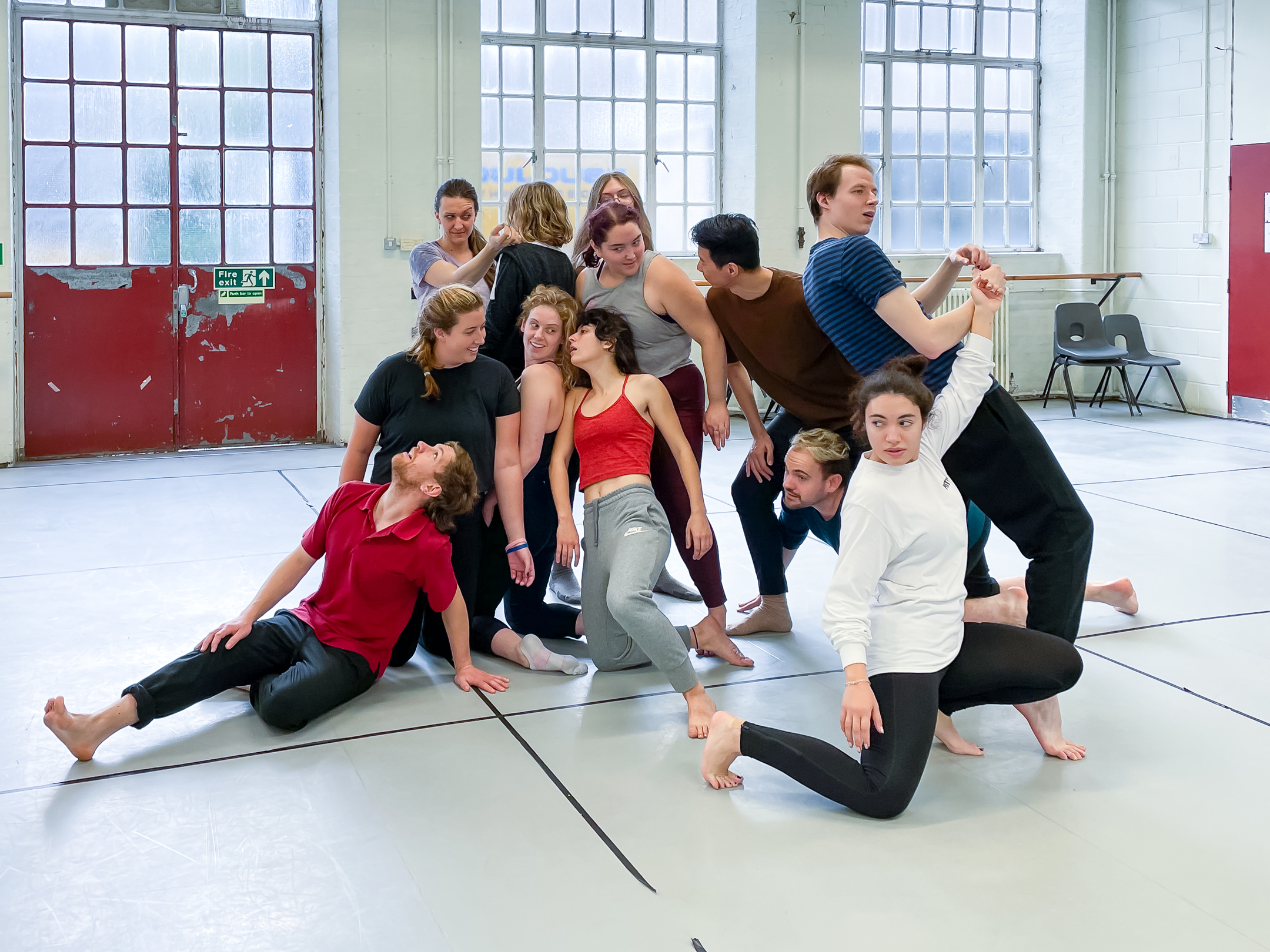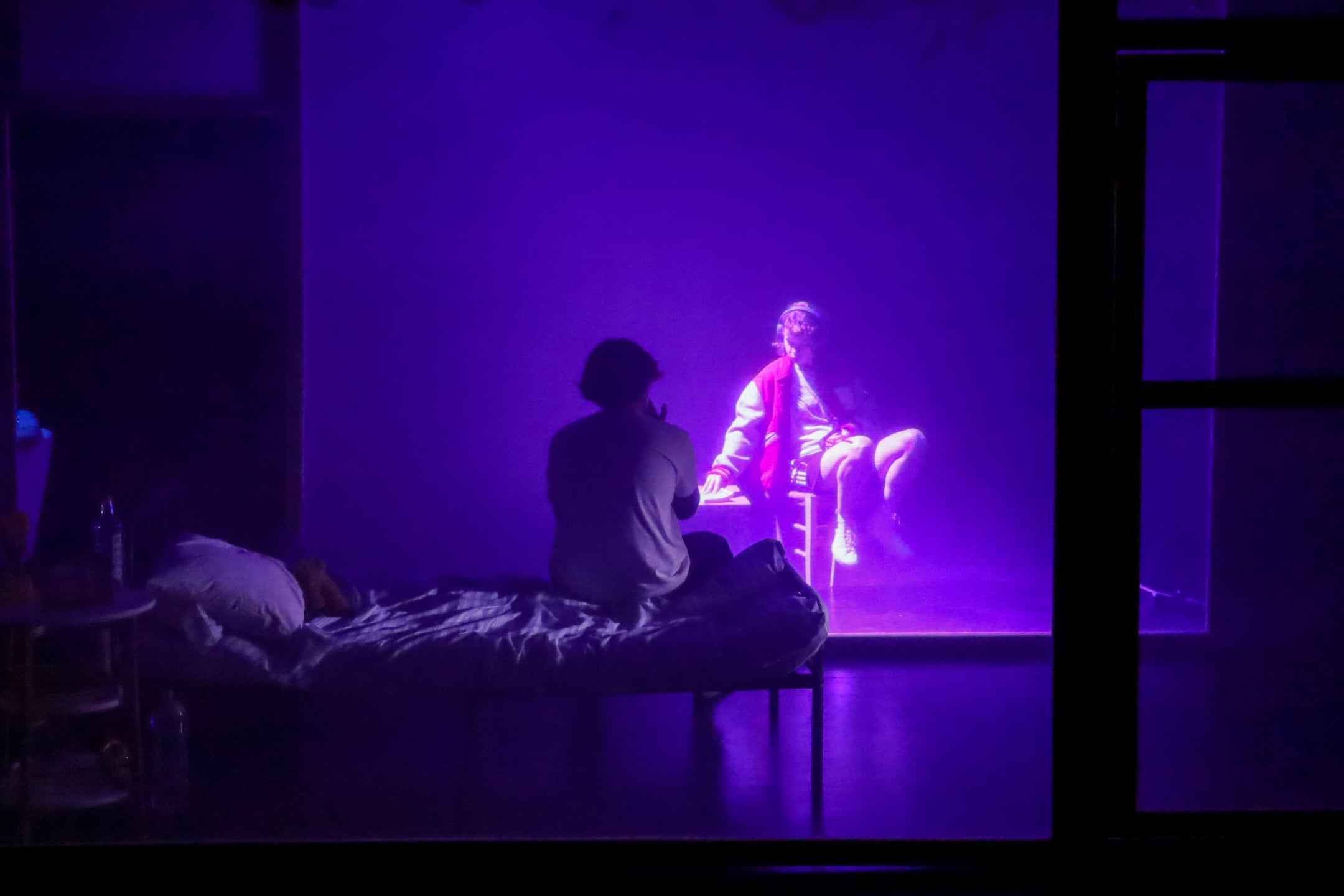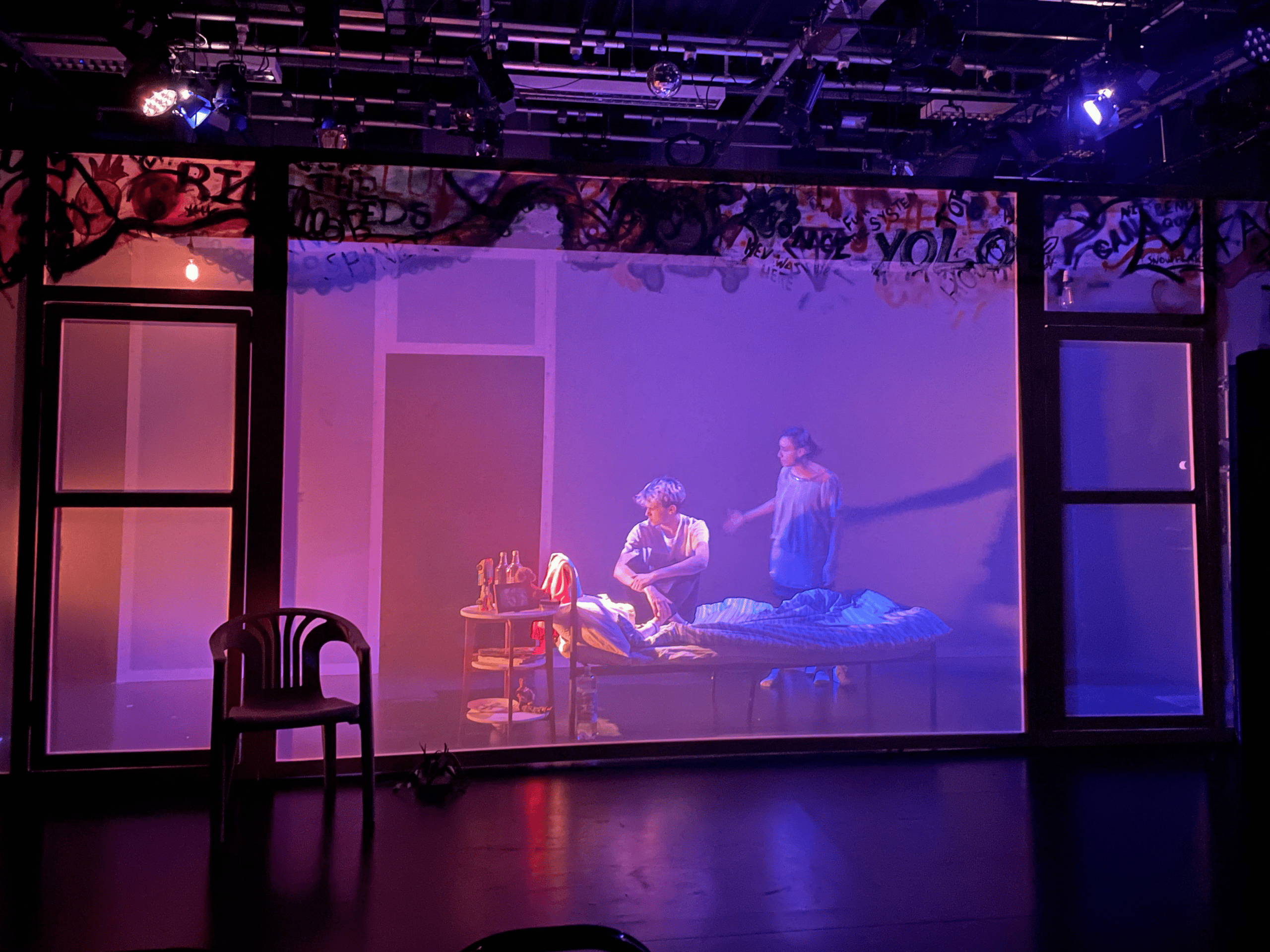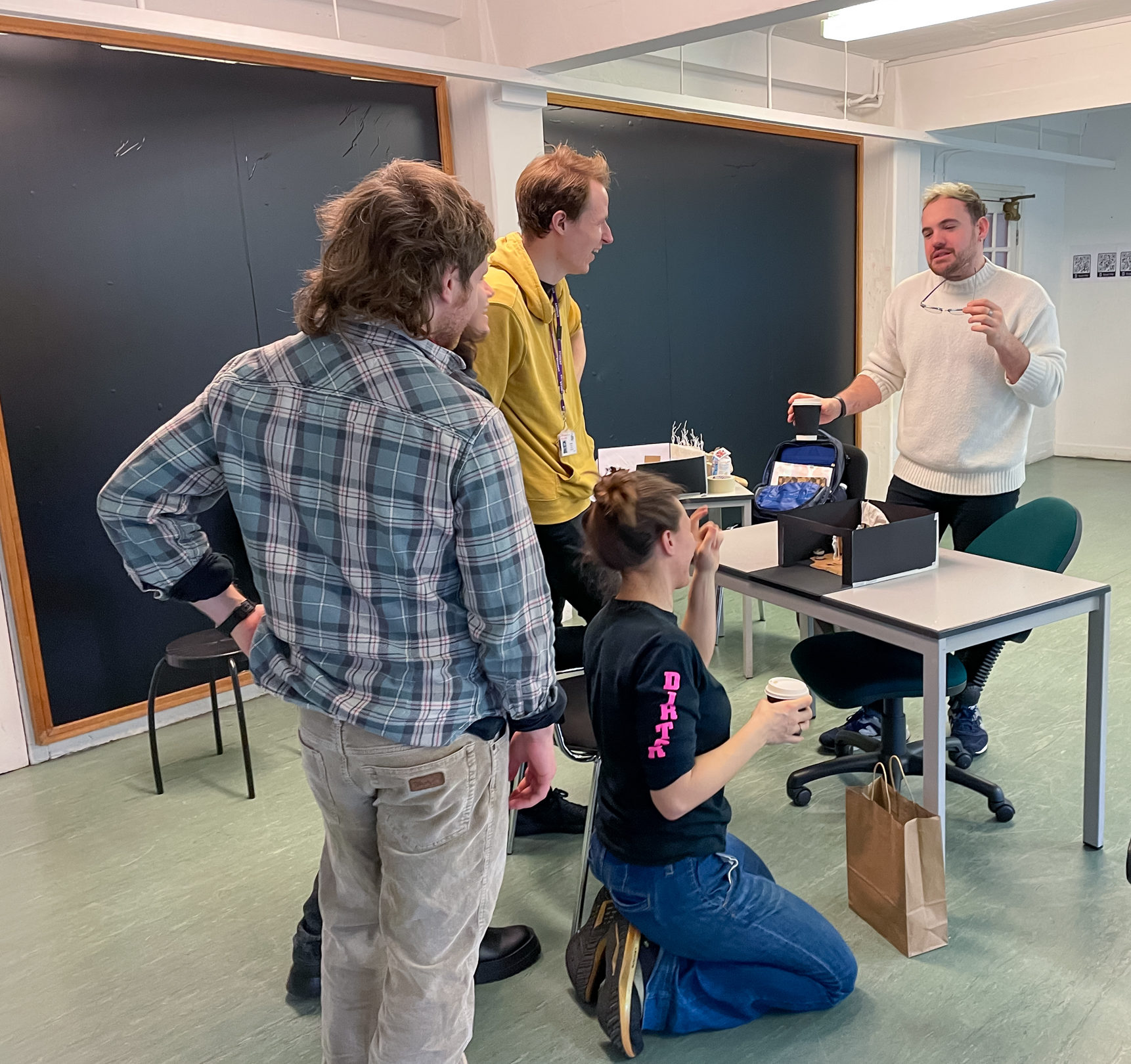
What you'll study
This advanced and rigorous MA/ MFA Contemporary Directing Practice programme offers an experiential two-year course, where students will develop their vocabulary and find their own voice and vision as a director, while acquiring and honing a diverse variety of skills, techniques, tools and devices.
The fully-taught MA programme is 13 months long, and graduates qualify in October of year two with the presentation of their Independent Research Project.
MFA students commence their year two with a fully resourced production of a One-Act Play, followed by a Professional Placement Module and, notably, Writing & Directing for Camera (resulting in the writing of a short film, learning the film language of making a film and directing actors for screen). MFA concludes with the Independent Professional Directing Project to be delivered at the end of the programme.
Students are supported by continuous assessment and regular tutorials with the Programme Director, and feedback from Visiting Tutors.

Why choose this course?
Expert training
A playground for personal and professional growth, and experimentation under the mentorship and instruction from established artists; professional encounters, talks and seminars with leading British and international theatre-makers. It is an exceptional opportunity to join and collaborate with a diverse and vibrant group of emerging theatre practitioners across the postgraduate school.
Unique approach
Master your directing techniques, tools and psycho-physical vocabulary on this experiential journey of discovery, developing the director’s individual voice and vision.
Resources and facilities
Be part of Rose Bruford’s creative student community. Collaborate with students and practitioners from other courses and disciplines across both postgraduate and undergraduate schools, with access to vast College resources and facilities, both online and on-campus.
Industry contacts and networking
Develop a professional network of creative relationships. Visiting lecturers, tutors and mentors have included: Annabel Arden, co-founder of Complicite; Walter Meierjohann, theatre director; Tinuke Craig, theatre director; Amy Hodge, theatre & film director; Sam Curtis Lindsay, Artistic Director Hackney Showroom; Jay Skelton; Sophie Fiennes, film-maker; Barbara Houseman; Timothy Sheader, Artistic Director Open Air Theatre; Emma Baggott, theatre director; Nikolai Foster, Artistic Director Curve, Leicester; Abigail Graham, theatre director; Jaz Woodstock-Stewart, theatre director; Mita Pujara and many others.

MA Course Structure
The MA runs over an extended academic year of 13 months.
It comprises of four taught modules over the course of three consecutive terms, followed by an Independent Research Project that results in a resourced practical project presentation documented in the Director’s Workbook.
Module 1: Embodying the Space
- Part 1: A foundation in wide-ranging mind-body skills and techniques, rooting directors in the language of improvised, devised, collaborative and immersive story-telling.
- Part 2: Creating and directing a Devised Piece and an Adaptation Project.
Module 2: Framing the Space
- Expending the director’s awareness and language of Visual and Spatial Storytelling, Visual and Musical Composition, and introducing approaches to Director–Designer creative collaboration.
Module 3: The Director's Journey
The core module that underpins the programme as a whole.
- Dialogue with the Playwright: Director Preparation from page to stage, working with complex texts, dramaturgy
- Director’s Lab: independent, practical scene-study and workshops; a practical exploration of Director-Actor interaction
Module 4: Professional Directing Practice
An inter-programme British Contemporary Theatre Project. Students will direct a fully-realised play in collaboration with European Theatre Arts BA performers, designers, lighting designers and technical arts students.
Module 5: Independent Research Project
An independent original piece of work; a creative articulation of your practice. The module is designed as the culmination of the programme as a whole, with the view to implementing the working methodologies and practices that have been assimilated and acquired.

MFA Course Structure
Directing for Stage and Screen
The MFA Contemporary Directing Practice is a two-year vocational programme. It provides director-training for those wanting an advanced practice-based course alongside rigorous academic study at postgraduate level to underpin and develop their work as directors for stage and screen.
Year One
Modules in Year One are shared with MA Contemporary Directing Practice. There are four taught modules over the course of three consecutive terms as highlighted above in the MA Course Structure section.
Year Two
It is comprised of three taught modules over the course of two consecutive terms, followed by the Independent Professional Directing Project, resulting in a presentation between July and September, documented in the Director’s Workbook.
MFA Year 2 - Module 5: Independent Professional Directing Project (IPDP)
- IPDP Part 1: One-Act Play (September – October 2022)
- A fully-realised production of a One-Act Play, chosen by the director
- IPDP Part 2: Final Independent Production (July – September 2023)
Building on IPDP Part 1, the final Independent Professional Directing Project facilitates the creation of an original piece of work. It is a creative articulation of your practice honed over the two years.
MFA Year 2 - Module 6: Professional Placement & Introduction to New Writing
- Professional Placement is an ongoing strand within the module and is undertaken over an extended period of six to eight weeks
- Working on a short New Writing Project
MFA Year 2 - Module 7: Directing for Camera
The module offers diverse 10-week film training. It is a combination of screen-writing seminars, followed by an introduction to film language and techniques that culminates in students shooting and directing actors in a series of scenes from the short film they have written.
Alumni Success

Taylor Ayling
Taylor’s credits include: International Theatre Amsterdam: Directing Internship, Ivo van Hove’s production of My Heavenly Favourite; Jan Fabre’s Troubleyn Theatre, Antwerp, Belgium: From Act to Acting Masterclass (Participant); Directing Masterclass with Sally Cookson, Regional Theatre Young Director Scheme (Participant).
Mikolaj Chrobot
Mikolaj’s credits as Director include: Mother Clap's Molly House by Mark Ravenhill (Rose Bruford College); Mary Lacy Woz Queer by Mark Daniels (King's Head Theatre); Hamlet's Mum, by Julia Smith (Etcetera Theatre). As Assistant Director: An Ideal Wife by Julia Smith (Etcetera Theatre, London).
Jordan Langford
Jordan’s credits as Director include: Happy (South and West Yorkshire Tour); Build a Rocket (Wonderville - West End, New Wimbledon Theatre, Manchester, Durham and Edinburgh Fringe Festivals). As Director/Choreographer: Sweet Charity (Festival Theatre Studios, Edinburgh); At Last, It’s Summer (London Palladium - Associate Director); Dick Whittington (Leeds Conservatoire with City Varieties).
How to join
Applications for 2025/26 will open on Thursday 14th November 2024.
Institution code: Not required for this course.
Course code: Not required for this course.
Entry requirements
Applicants for Masters programmes will be expected to have a good undergraduate degree in a related subject area. The College also encourages applications from those without formal qualifications who may be accepted based on professional experience.
Applications remain open until the course is full. However, we understand the unique circumstances of international applicants and accept their late applications to our postgraduate programmes until 31 July.
Please get in touch with us at [email protected] for information on entry criteria if you are applying from outside the UK. You can also visit our international students page.
Application Guidance
To apply, please submit an online application.
As part of the application, you will be asked to provide a detailed personal statement expressing why you are interested in studying on the course. Your personal statement should include a summary of your academic, professional and/or life experiences. You should conclude by explaining what your aspirations are once you have completed the programme.
Interview with portfolio
If you are invited to interview, you will be asked to submit your portfolio in advance.
Portfolio Guidelines
Portfolio of creative work can include samples of one or all of the following:
- A short recorded extract of work you have directed or choreographed for stage, film or radio or acted in (it could be a piece you may have directed/ acted in live or on Zoom).
- A sample of your creative writing (a play or a scene from a play, poems, or a short film, a review of a play or film, or anything else).
- A short monologue or poem: the text can be an example of your own work, or can come from any play, era or poet. It should be a piece that you feel reflects your interests and strengths as a performer/ theatre-maker. It should be no more than two minutes long, performed from memory (in English), and filmed/ recorded with you speaking directly to the camera.
Presentation
If you are successful following the interview, we will ask you to prepare a creative task and presentation tailored to you as an individual.
Course Summary
Duration
MA 13 months MFA 24 Months
Mode of study
Full time
Start date
October 2025
Course Type
Postgraduate Course
Course Fees (2025 Entry)
MA UK & Republic of Ireland Students (180 credits)
£18100
MA International Students (180 credits)
£24150
MFA UK & Republic of Ireland Students (240 credits)
£36200
MFA International Students (240 credits)
£48300

